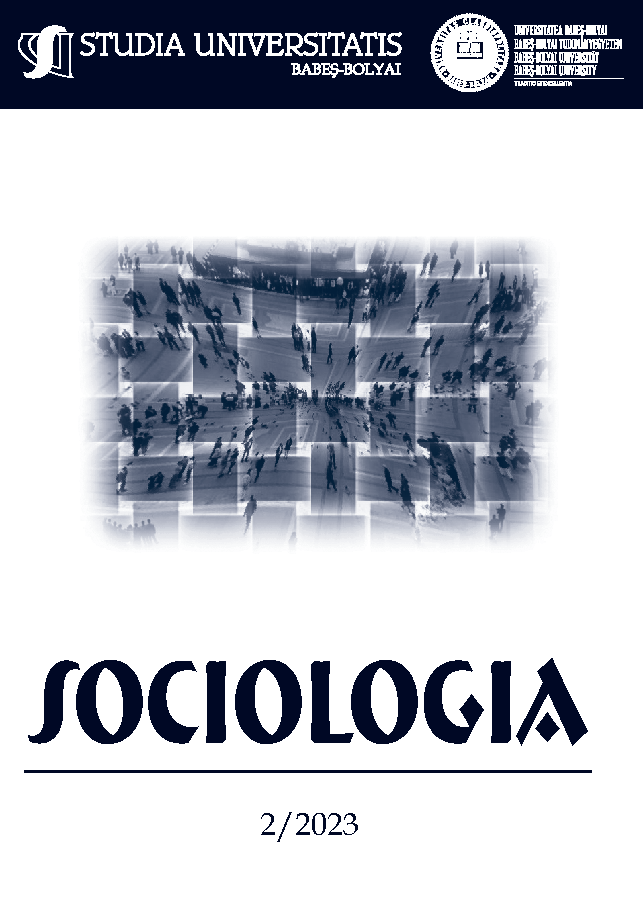Precarious Industrial Labour at the Edge of the European Union: The Case of Baia Mare
DOI:
https://doi.org/10.2478/subbs-2023-0006Keywords:
labour, dispossession, capitalism, RomaniaAbstract
Tens of thousands of labourers work in the factories in and around Baia Mare, a city that is being reindustrialized after an initial industrialization under state socialism. In 2021, most workers were being paid about 280 euro a month, as companies were aiming to achieve the lowest possible production costs while remaining within the European Union. Workers and their families, unable to make do on their low wages alone, constantly scramble for means to supplement their income. Many work overtime systematically; some choose to migrate for work abroad for a few months every year; yet others quit their factory jobs for more lucrative opportunities during the summers, only to return to the factories in the autumn. In this paper, I look at the industrial history of Baia Mare and the work lives of labourers to understand how the workers in the region were impacted by the politics of dispossession. I use two complementary lenses: on the one hand, I understand their position at the junction of global, national, and local forces; on the other hand, I underline the ways in which this specific case speaks to the workings of global capital, not as an exception, but as one of many interconnected stories of human experience.
References
Apador-CH (2012, June 7). Rasismul din Baia Mare, huiduit la București. Retrieved from apador.org, https://apador.org/rasismul-din-baia-mare-huiduit-la-bucuresti-2/, 15/Nov/2023.
Ban, Cornel (2014). Dependență și dezvoltare. Economia politică a capitalismului românesc. Cluj: Tact.
Braverman, Harry (1998). The Degradation of Work in the Twentieth Century. In Labor and Monopoly Capital. The Degradation of Work in the Twentieth Century, New York: Monthly Review Press, 317–25.
Burawoy, Michael (1982). Manufacturing Consent. Changes in the Labour Process under Monopoly Capitalism. Chicago: University of Chicago Press.
Carbonella, August., and Kasmir, Sharryn (2014). Toward a Global Anthropology of Labor. In S. Kasmir and A. Carbonella (eds.) In Blood and Fire: Toward a Global Anthropology of Labor. New York and Oxford: Berghahn, pp. 1–29.
Cucu, Alina (2019). Planning Labour. Time and the Foundations of Industrial Socialism in Romania. New York and Oxford: Berghahn.
Deacu, Cătălin (2016). The collapse of the state industry in Romania: between political and economic drivers. Human Geographies 10(2): 115-127.
Deneva, Neda (2024). “The flexibility and mobility of labor, the temporality of industrial life and the reproduction of poverty under capitalism”. In Manufacturing Poverty for the Romanian Roma: Roots, Mechanisms, Struggles, edited by Enikő Vincze, Cornel Ban, Sorin Gog, and Jon Horgen Friberg. London: Routledge Press.
Dincă, Cornelia (2023). ‘140.000 de noi muncitori străini sunt așteptați în România în 2023’. Retrieved from Termene, https://termene.ro/articole/140-000-de-noi-muncitori-straini-sunt-asteptati-in-romania-in-2023, 15/Nov/2023.
Friberg, Jon H., and Midtbøen, Arnfinn H. (2018). Ethnicity as Skill: Immigrant Employment Hierarchies in Norwegian Low-Wage Labour Markets. Journal of Ethnic and Migration Studies 44(9): 1463–78.
Grama, Adrian (2018). Laboring Along: Industrial Workers and the Making of Postwar Romania. Berlin and Boston: De Gruyter.
Grigorescu, Denis (2023, September 21). ‘România, El Dorado pentru angajații asiatici. De ce îi preferă patronii români: „Cauzele pentru care vin aici sunt clare” ’. Retrieved from Adevărul, https://adevarul.ro/economie/romania-el-dorado-pentru-angajatii-asiatici-de-2301645.html#google_vignette, 15/Nov/2023.
Guga, Ștefan (2021). Salariul minim și traiul minim decent: De la mituri la oportunități. București: Friedrich-Ebert-Stiftung.
Harvey, David (2003). The New Imperialism. Oxford: Oxford University Press.
Narotzky, Susana (2018). Rethinking the Concept of Labour. Journal of the Royal Anthropological Institute 24(S1): 29–43.
Polanyi, Karl (2013). Marea Transformare. Cluj: Tact.
Raț, Cristina (2019). Social Citizenship at the Margins. In E. Vincze, N. Petrovici, C. Raț, and G. Picker (eds.), Racialized Labour in Romania. Basingstoke: Palgrave Macmillan, pp. 97–121.
Reștea, Kristina (2023, September 4). ‘Câți români trăiesc cu salariul minim în România și care sunt domeniile în care se câștigă acestea’. Retrieved from Economedia.ro, https://economedia.ro/analiza-cati-romani-traiesc-cu-salariul-minim-in-romania-si-care-sunt-domeniile-in-care-se-castiga-acestea.html, 15/Nov/2023.
Sandu, Dumitru, and Popa, Dan (2023, October 5). ‘Românii plecați în străinătate care au revenit. Motivele invocate și explicațiile sociologului Dumitru Sandu’. Retrieved from Hotnews: https://economie.hotnews.ro/stiri-finante_banci-26583820-aproape-jumatate-milion-romani-reintors-tara-motivele-invocate-explicatiile-sociologului-dumitru-sandu.htm, 15/Nov/2023.
Șomănescu, Cristina (2018, July 25). ‘România profundă: Judeţele în care majoritatea salariaţilor câştigă salariul minim pe economie’. Retrieved from Economica.net, https://www.economica.net/judetele-in-care-majoritatea-salariatilor-castiga-in-jurul-salariului-minim-pe-economie_156375.html, 15/Nov/2023.
Szabó, Árpád Töhötöm (2018). Local and Global Contexts, Individual Experiences in Labour: Poor Roma at Home and Abroad. A Case from Transylvania, Romania. Local Economy 33(2): 207–23.
Vischi, Cătălin (2022, September 11). ‘Cel mai mare angajator din Maramureș, produ¬cătorul de mobilă Aramis Invest, a depășit 6000 de angajați’. Retrieved from 2mnews, https://2mnews.ro/analiza-2mnews-cel-mai-mare-angajator-din-maramures-producatorul-de-mobila-aramis-invest-a-depasit-6-000-de-angajati-si-se-situeaza-pe-locul-18-in-topul-national/, 15/Nov/2023.
Vischi, C. (2022, August 9). ‘Top 25 de firme cu cele mai mari afaceri din județul Maramureș și identitățile proprietarilor’. Retrieved from 2mnews, https://2mnews.ro/exclusiv-top-25-de-firme-cu-cele-mai-mari-afaceri-din-judetul-maramures-si-identitatile-proprietarilor-doua-firme-trec-peste-1-miliard-de-lei-an/, 15/Nov/2023.
Vischi, C. (2020, May 28). ‘Cum a crescut în ultimii 200 de ani populația din Baia Mare’. Retrieved from 2mnews: https://2mnews.ro/analiza-grafica-cum-a-crescut-in-ultimii-200-de-ani-populatia-din-baia-mare/, 15/Nov/2023.
Downloads
Published
How to Cite
Issue
Section
License
Copyright (c) 2024 Studia Universitatis Babeș-Bolyai Sociologia

This work is licensed under a Creative Commons Attribution-NonCommercial-NoDerivatives 4.0 International License.






